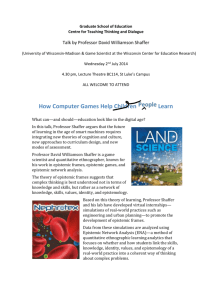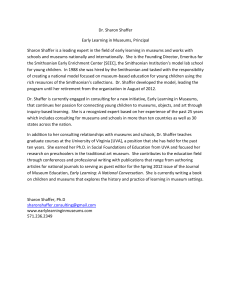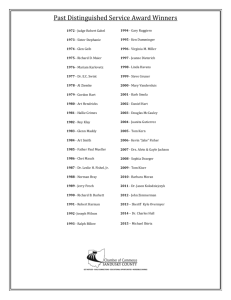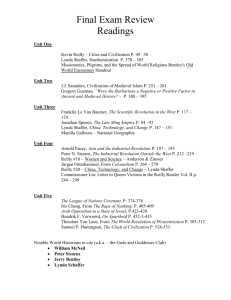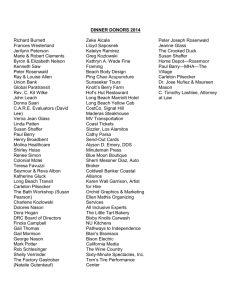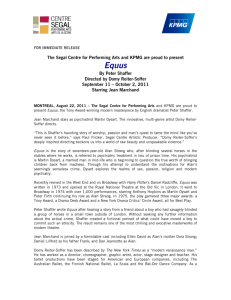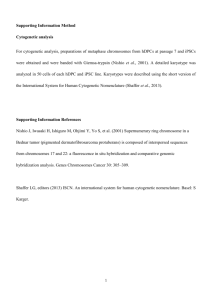Peter Shaffer
advertisement
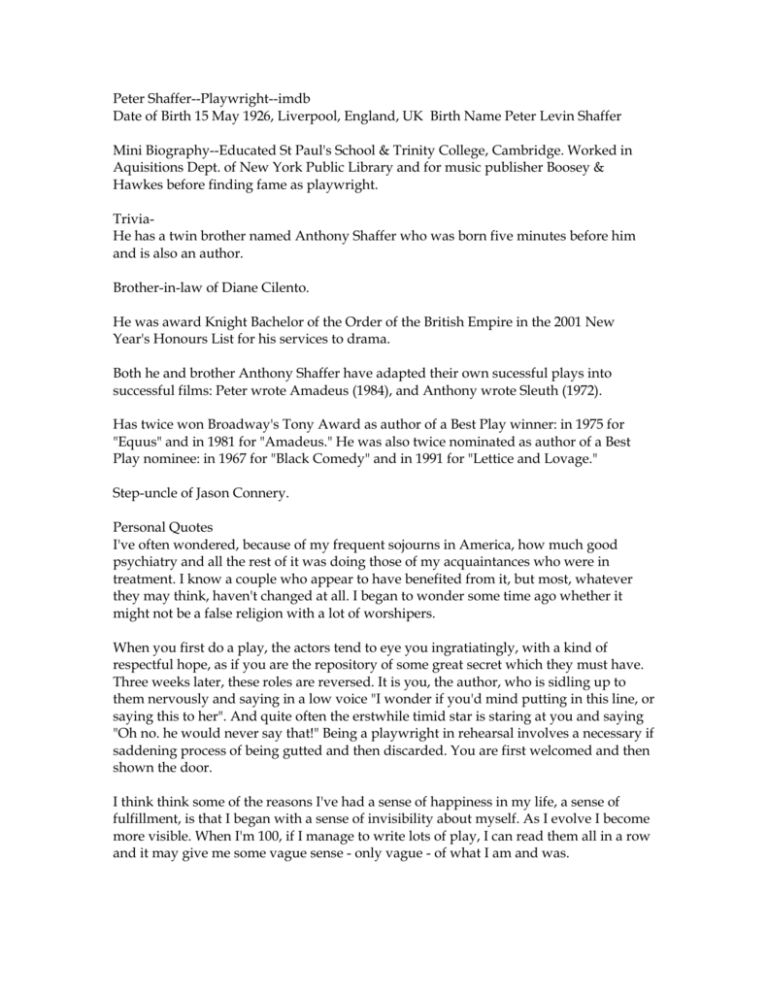
Peter Shaffer--Playwright--imdb Date of Birth 15 May 1926, Liverpool, England, UK Birth Name Peter Levin Shaffer Mini Biography--Educated St Paul's School & Trinity College, Cambridge. Worked in Aquisitions Dept. of New York Public Library and for music publisher Boosey & Hawkes before finding fame as playwright. TriviaHe has a twin brother named Anthony Shaffer who was born five minutes before him and is also an author. Brother-in-law of Diane Cilento. He was award Knight Bachelor of the Order of the British Empire in the 2001 New Year's Honours List for his services to drama. Both he and brother Anthony Shaffer have adapted their own sucessful plays into successful films: Peter wrote Amadeus (1984), and Anthony wrote Sleuth (1972). Has twice won Broadway's Tony Award as author of a Best Play winner: in 1975 for "Equus" and in 1981 for "Amadeus." He was also twice nominated as author of a Best Play nominee: in 1967 for "Black Comedy" and in 1991 for "Lettice and Lovage." Step-uncle of Jason Connery. Personal Quotes I've often wondered, because of my frequent sojourns in America, how much good psychiatry and all the rest of it was doing those of my acquaintances who were in treatment. I know a couple who appear to have benefited from it, but most, whatever they may think, haven't changed at all. I began to wonder some time ago whether it might not be a false religion with a lot of worshipers. When you first do a play, the actors tend to eye you ingratiatingly, with a kind of respectful hope, as if you are the repository of some great secret which they must have. Three weeks later, these roles are reversed. It is you, the author, who is sidling up to them nervously and saying in a low voice "I wonder if you'd mind putting in this line, or saying this to her". And quite often the erstwhile timid star is staring at you and saying "Oh no. he would never say that!" Being a playwright in rehearsal involves a necessary if saddening process of being gutted and then discarded. You are first welcomed and then shown the door. I think think some of the reasons I've had a sense of happiness in my life, a sense of fulfillment, is that I began with a sense of invisibility about myself. As I evolve I become more visible. When I'm 100, if I manage to write lots of play, I can read them all in a row and it may give me some vague sense - only vague - of what I am and was. [on using LSD] It was a transporting experience, expressed in very concrete images, places and periods. It involved both generic pictures [from China and the Congo] and more strictly autobiographical ones (a book-laden boy in perhaps 1850 walking to Hebrew School through a labyrinth of alleys, perhaps in Kiev). I have never forgotten it or moved far from the sense of wonder it provided and a fairly constant gratitude for the infinite complexity of being it revealed to me. Wikipedia Sir Peter Levin Shaffer (born 15 May 1926) is an English playwright and screenwriter of numerous award-winning plays, several of which have been filmed. Early life: Shaffer was born to a Jewish family in Liverpool, the son of Reka (née Fredman) and Jack Shaffer, an estate agent.[1][2] He is the twin brother of fellow playwright, Anthony Shaffer. He was educated at St Paul's School, London and subsequently he gained a scholarship to Trinity College, Cambridge, to study history. Shaffer was a Bevin Boy coal miner during World War II, and took a number of jobs including bookstore clerk, and assistant at the New York Public Library, before discovering his dramatic talents. Theatrical career Shaffer's first play, The Salt Land (1954), was presented on the BBC. Encouraged by this success, Shaffer continued to write and established his reputation as a playwright in 1958, with the production of Five Finger Exercise,[3] which opened in London under the direction of John Gielgud and won the Evening Standard Drama Award. When Five Finger Exercise moved to New York in 1959, it was equally well received and landed Shaffer the New York Drama Critics' Circle Award for Best Foreign Play. Shaffer's next piece was a double bill, The Private Ear/The Public Eye, two plays each containing three characters and concerning aspects of love. They were presented in May 1962 at the Globe Theatre, and both starred Maggie Smith. In 1963, the National Theatre was established, and virtually all of Shaffer's subsequent work was done in its service. Shaffer's canon contains a unique mix of philosophical dramas and satirical comedies. The Royal Hunt of the Sun (1964) presents the tragic conquest of Peru by the Spanish, while Black Comedy (1965) takes a humorous look at the antics of a group of characters feeling their way around a pitch black room — although the stage is actually flooded with light. Equus (1973) won Shaffer the 1975 Tony Award for Best Play as well as the New York Drama Critics' Circle Award. A journey into the mind of a 17-year-old stableboy who had plunged a spike into the eyes of six horses, Equus ran for over 1000 performances on Broadway. It was revived by Massachusetts' Berkshire Theatre Festival in the summers of 2005 and 2007, by director Thea Sharrock at London's Gielgud Theatre in February 2007, and on Broadway (in the Sharrock staging) in September 2008. The latter production, which ran in New York until February 2009, required the stableboy to appear naked; its star, Daniel Radcliffe, was still associated with the Harry Potter films intended for general audiences, and this led to mild controversy.[4] Shaffer followed this success with Amadeus (1979) which won the Evening Standard Drama Award and the Theatre Critics Award for the London production. This tells the story of Wolfgang Amadeus Mozart and court composer Antonio Salieri who, overcome with jealousy at hearing the "voice of God" coming from an "obscene child", sets out to destroy his rival. When the show moved to Broadway it won the 1981 Tony Award for Best Play and, like Equus, ran for more than 1000 performances.[citation needed] Screen adaptations[edit] Several of Shaffer's plays have been adapted to film, including Five Finger Exercise (1962), The Royal Hunt of the Sun (1969), The Public Eye (1962), from which he adapted the 1972 film Follow Me! (1972), Equus (1977), and Amadeus (1984), which won eight Academy Awards including Best Picture. Shaffer received two Academy Award–nominations for adapting his plays Equus and Amadeus for the big screen. For writing the screenplay for Equus, he was nominated for the 1977 Best Adapted Screenplay Oscar but the award went to Alvin Sargent, who wrote the screenplay for Julia. For writing the screenplay for Amadeus, Shaffer received both the 1984 Best Screenplay Golden Globe and the 1984 Best Adapted Screenplay Oscar. Awards- Shaffer received the William Inge Award for Distinguished Achievement in the American Theater in 1992. Two years later he was appointed Cameron Mackintosh Visiting Professor of Contemporary Theatre at Oxford University. In 1993, he was awarded an Honorary Degree (Doctor of Letters) by the University of Bath.[5] Honours-He was named Knight Bachelor in the 2001 New Year's Honours. Selected works The Salt Land (1954) Balance Of Terror (1957) The Prodigal Father (1957) Five Finger Exercise (1958) The Private Ear and The Public Eye (1962) The Establishment (1963) The Merry Roosters Panto (1963) The Royal Hunt of the Sun (1964), a theatre piece on Atahualpa, the last emperor of the Tahuantinsuyu. Black Comedy (1965) The White Liars (1967) Shrivings (1970) Equus (1973) Amadeus (1979) Black Mischief (1983) Yonadab (1985) Lettice and Lovage (1987) Whom Do I Have The Honour Of Addressing? (1990) The Gift of the Gorgon (1992) References[edit] ^ "Peter Shaffer Biography". Filmreference.com. 1926-05-15. Retrieved 2010-09-14. ^ "The Jewish Daily Forward". Forward.com. Retrieved 2010-09-14. ^ Stevens, Christopher (2010). Born Brilliant: The Life Of Kenneth Williams. John Murray. p. 377. ISBN 1-84854-195-3. ^ "Naked stage role for Potter star". BBC News. 28 July 2006. Retrieved 2007-02-22. ^ "Honorary Graduates 1989 to present". bath.ac.uk. University of Bath. Retrieved 18 February 2012.

